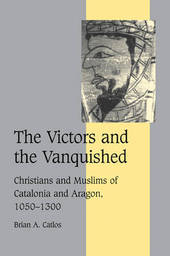
|
The Victors and the Vanquished: Christians and Muslims of Catalonia and Aragon, 1050-1300
Paperback / softback
Main Details
| Title |
The Victors and the Vanquished: Christians and Muslims of Catalonia and Aragon, 1050-1300
|
| Authors and Contributors |
By (author) Brian A. Catlos
|
| Series | Cambridge Studies in Medieval Life and Thought: Fourth Series |
|---|
| Physical Properties |
| Format:Paperback / softback | | Pages:480 | | Dimensions(mm): Height 226,Width 150 |
|
| Category/Genre | Interfaith relations
History of religion |
|---|
| ISBN/Barcode |
9780521036443
|
| Classifications | Dewey:946.02 |
|---|
| Audience | | Professional & Vocational | |
|---|
| Illustrations |
7 Maps
|
|
Publishing Details |
| Publisher |
Cambridge University Press
|
| Imprint |
Cambridge University Press
|
| Publication Date |
14 May 2007 |
| Publication Country |
United Kingdom
|
Description
This is a revisionary study of Muslims living under Christian rule during the Spanish 'reconquest'. It looks beyond the obvious religious distinctions and delves into the subtleties of identity in the thirteenth-century Crown of Aragon, uncovering a social dynamic in which sectarian differences comprise only one of the many factors in the causal complex of political, economic and cultural reactions. Beginning with the final stage of independent Muslim rule in the Ebro valley region, the book traces the transformation of Islamic society into mudejar society under Christian domination. This was a case of social evolution in which Muslims, far from being passive victims of foreign colonisation, took an active part in shaping their institutions and experiences as subjects of the Infidel. Using a diverse range of methodological approaches, this book challenges widely held assumptions concerning Christian-Muslim relations in the Middle Ages, and minority-majority relations in general.
Author Biography
Brian A. Catlos is Assistant Professor of History at the University of California, Santa Cruz.
Reviews'... a ground-breaking study that ... is a remarkable, and also highly readable, work of scholarship.' The English Historical Review
|